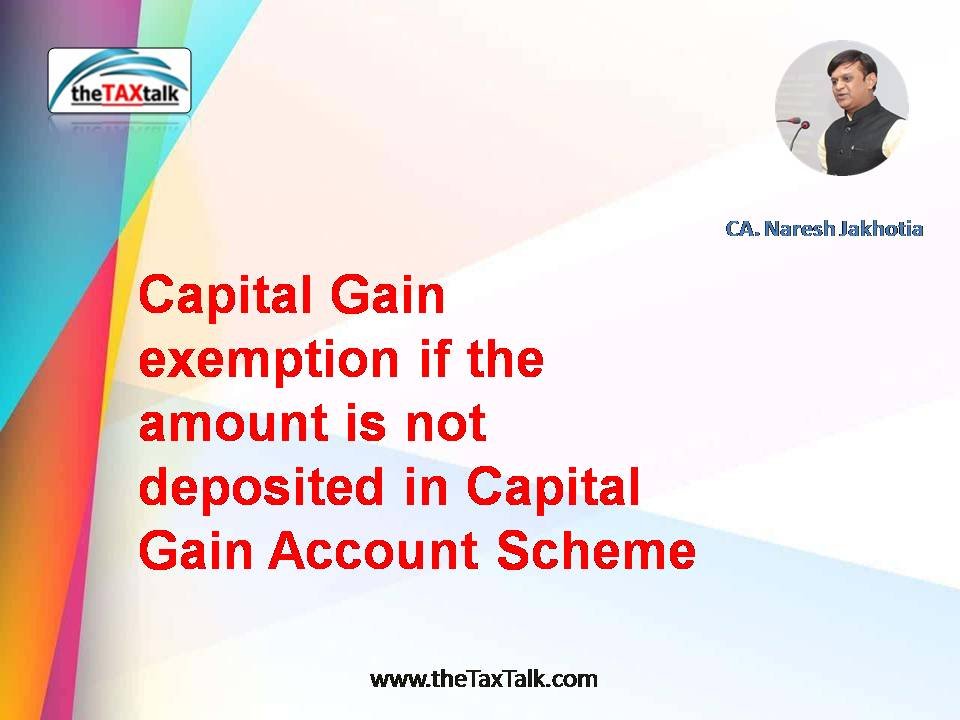![]()
Capital Gain exemption if the amount is not deposited in Capital Gain Account Scheme
Investing the amount for purchase or construction of another house property is one of the most common modes adopted for saving tax on Long Term Capital Gain (LTCG). Exemption is admissible under section 54 & Section 54F of the Income Tax Act-1961. Section 54 provides exemption if gain arises from transfer of any residential house property whereas Section 54F does the same if it arises from transfer of any capital assets (other than residential house property). Under both the sections, capital gain is exempt if such gains are invested towards purchase or construction of a new residential house, within the specified time frame. The prescribed time frame for capital gain exemption is as under:
i] For purchase:
One year before or two years after the date of sale or transfer.
ii] For Constructions:
Three years from the date of sale or transfer.
Income Tax Return (ITR) is to be filed within the due date even though there is a time period of 2 years/3 years for investment. To allow exemption, income tax law provides for investment in the “Capital Gains Account Scheme (CGAS)” if the taxpayer is unable to invest the amount before the due date of filing the ITR. This amount deposited in CGAS is subsequently required to be utilized for purchase/ construction of a new residential house within the time frame.
The question arises, whether exemption would still be admissible if the taxpayers doesn’t deposit the amount in CGAS but utilizes the amount directly for purchase or construction within a stipulated period of 2 or 3 years? Recently, Delhi bench of ITAT in the case of Sarita Gupta Vs. Pr. CIT [ITA No.1174/Del/2022] has held that mere non-deposit of the amount into the CGAS for the interim period cannot be the basis to decline the exemption claimed U/s 54. With this judgment widely getting circulated in various media, taxpayers are forming the perception that the deposit in CGAS is not mandatory and the exemption can be claimed by purchasing / constructing within a period of 2 or 3 years without investing it in the CGAS account during the interim period.
Earlier, similar views has been affirmed by Karnataka High Court in the case of CIT Vs. Ramachandra Rao 56 taxmann.com 163 & Madras High Court in Venkata Dilip Kumar Vs. CIT 111 Taxmann.com 180 (Mad) wherein the courts have held that the legislative intent behind Section 54 as well as Section 54F of the Income Tax Act, 1961 is to promote housing. Both the sections allow exemption to an Individual / HUF, who reinvest the amount for purchase or construction of a Residential House and deposit in CGAS is merely a procedural requirement. If substantive compliance by purchase / construction is done, it would be enough to warrant the exemption.
However, Bombay High Court in Humayun Suleman Merchant v. CCIT, Mumbai (2016) 96 CCH 0149 deviated from the above views with following observation:
- Exemption provision requires strict compliance with the conditions specified therein. If the words of the statute are plain and clear, strict compliance with the conditions specified in the legislation is necessary for availing the exemption benefit.
- It is a settled position in law that the issue of giving beneficial construction to a statute cannot arise if there is no ambiguity in the provision of law. In the face of the clear words of the Statute, the intent of parties and/or beneficial construction is irrelevant.
- Apex court in Sales Tax Commissioner vs. Modi Sugar Mills [1961] 12 STC 182 reiterated the well settled principle of interpretation in the following words:
“In interpreting a taxing statute, equitable considerations are entirely out of place. Nor can taxing statute be interpreted on any presumption or assumptions….It must interpret a taxing statute in the light of what is clearly expressed …”. - We are with respect unable to accept the reasoning adopted by Karnataka High Court in K. Ramchandra Rao. The mandate of the section is clear. The amount which has not been utilized in construction and/or purchase of property before filing the ITR must necessarily be deposited in an account duly notified by the Central Government, so as to be exempted.
- In this case, the provision is very clear. There is no ambiguity & so there is no occasion to apply liberal / beneficial construction while interpreting the Section as contended by the Appellant
Conclusion:
Taxpayers may note that allowability of the exemption under Sec 54 and 54F for investment in a residential house without depositing in the CGAS has been subject matter of litigation for a considerable length of time. There are conflicting judgments of the judiciary on this issue and the recent judgement by ITAT Delhi may not be considered as a settled provision of law. The view taken in Humayun Suleman Merchant by the Bombay High Court is grounded largely upon the adoption of a pragmatic or strict interpretation of the fiscal statute & not on purposive or equitable interpretation. It is advisable for the taxpayers to keep the amount in CGAS if they intend to claim an exemption by purchasing or constructing the house property within a period of 2 or 3 years.


